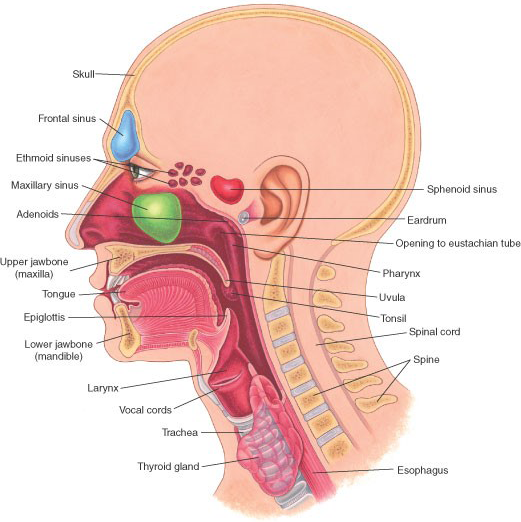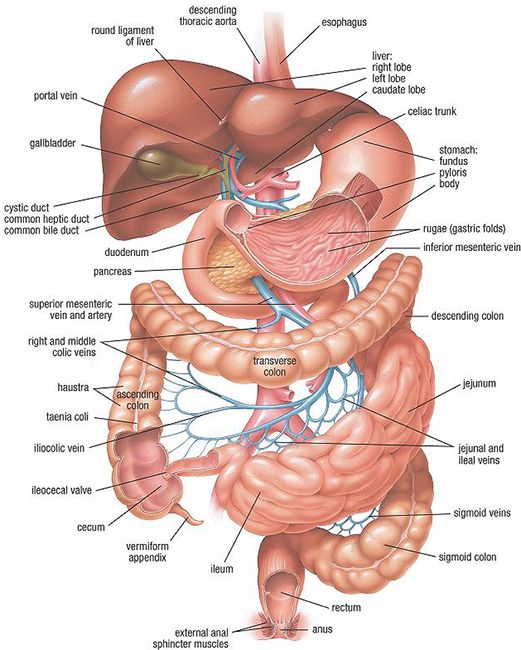General Information about Gastrointestinal Cancer
Gastrointestinal cancer is a broad term used to describe any cancer that originates from the digestive system. This includes cancers of the esophagus, gallbladder, liver, pancreas, stomach, small and large intestine, rectum and anus. Presenting symptoms may vary depending on which part of the gastrointestinal system is positive for cancer. A common diagnostic tool for various gastrointestinal cancers includes an endoscopy or colonoscopy followed by a biopsy. The location and extent of the tumor will dictate the preferred method of treatment.
Facts about the Various Gastrointestinal Cancers
- Esophageal cancer is a relatively rare form of cancer that appears in men more than women and has been tied to heavy use of alcohol, smoking, and GERD (gastro-esophageal reflux disease).
- Stomach cancers are often asymptomatic due to the fact that the tumor is growing in a large cavity. This type of cancer is much more prevalent in Asia.
- Hepatocellular Carcinoma is the most common type of liver cancer and fortunately is rare in the United States. HCC has been associated with alcoholism, toxins, cirrhosis of the liver, and hepatitis.
- Gallbladder tumors are also very rare and has a U.S. incidence of approximately 0.00003% amongst the population.
- Like HCC and Gallbladder tumors, pancreatic tumors share similar presenting symptoms such as abdominal pain, lower back pain, and jaundice.
- Colorectal cancers are the most common of the gastrointestinal cancers and are 4th most common of all cancers. The occurrence of colorectal cancers has been largely attributed to a diet high in animal fat and low in fiber.
- Anal Cancer is often related to HPV (human papilloma virus) infection. This type of cancer is very response to chemotherapy and radiation. Surgery is rarely used.
Signs and Symptoms of Gastrointestinal Cancers
Signs and symptoms depend heavily on the location of the cancer in the GI system. In general, most patients present with nausea, vomiting, and weight loss. Some cancers may cause bleeding and change in the colors of the stool. These symptoms progressively worsen and do not get better without treatment. If you are experiencing these symptoms, you should be evaluated by a medical doctor as soon as possible.
Gastrointestinal Anatomy


Helpful Terms Regarding Gastrointestinal Cancer
- Abdominoperineal Resection (APR) - Surgical procedure used to treGI1at low lying rectal cancers and involves the removal of the anus, rectum, and section of the sigmoid colon.
- Low Anterior Resection (LAR) - An abdominal incision that removes rectal cancers higher in the rectum.
- Dysphagia - Difficulty with swallowing.
- Esophagitis - Inflammation of the esophagus.
- Familial adenomatous polyposis - Hereditary disease in which the entire large bowel is studded with polyps.
- Leukopenia - Deficiency in white blood cell count.
- Odynophagia - Painful swallowing.
- Tenesmus - Ineffective and painful straining during a bowel movement due to anal sphincter contraction.
- Thrombocytopenia - Abnormal decrease in the number of platelets.
Treatment for Gastrointestinal Cancers
Esophageal cancer
Treatment is dependent on the histology of the cancer (squamous cell vs. adenocarcinoma), staging of the disease, and patient's medical condition. Surgery along with chemotherapy and radiation are commonly used.
Stomach cancers
Depending on the stage of the disease, treatments may include surgery, chemotherapy, and/or radiation therapy. Surgery generally includes removal of part or all of the stomach and some of the regional lymph nodes.
Liver cancer
A number of treatment methods are used when managing liver cancer. Some procedures include surgical resection, liver transplantation, radiation therapy, chemotherapy, and cryosurgery.
Gall bladder
The most common form of treatment is surgical removal of the gall bladder. Dissection of parts of the liver and lymph nodes are also performed at this time. Occasionally radiation therapy and chemotherapy is utilized in the management of gall bladder tumors.
Pancreatic cancer
The Whipple procedure is the most common type of surgical treatment used for curative purposes. This is done when the cancer involves the head of the pancreas. The surgery involves the removal of the head of the pancreas and parts of the small intestines. Chemotherapy and/or radiation are commonly used after surgery to increase the rate of cure.
Colorectal cancers
Surgery, radiation therapy, and chemotherapy have all been utilized in the management of colorectal cancers. The most common form of surgery for rectal cancer patients is the Abdominoperineal Resection (APR) or Low Anterior Resection (LAR). A colorectal surgeon will evaluate which surgical procedure is most appropriate. Radiation therapy is commonly used for more advanced rectal cancers. If used before surgery, radiation therapy can aid in the shrinking of the tumor before surgical removal. Furthermore, radiation therapy is used to optimize cure by treating lymph nodes and managing the surgical margins for potential microscopic disease. Chemotherapy drugs are often given along with radiation to enhance the chance for cure.
Frequently Asked Questions
Q: What are the side effects from radiation to the gastrointestinal system?
A: Radiation treatments are designed to be localized and site specific. For this reason, any potential side effects are directly related to the area being treated. Common acute side effects during treatments with radiation include redness of the skin, trouble eating, nausea, vomiting, and weight loss. Long term side effects can vary depending on the area treated. Most side effects are temporary.
Q: What diet should I be on during radiation treatments?
A: Dietary restrictions will depend on what part of the gastrointestinal system is being treated. Patients who experience difficulty eating should consume a high calorie liquid/soft diet (such as protein shakes) to help maintain body weight. Patients that are at risk for diarrhea should minimize their fiber intake. If you do have loose stools or diarrhea we recommend eating plain oatmeal, white rice, ripe bananas, applesauce, white toast, canned fruit without the skins, such as peaches and pears, white pasta noodles, cream of rice cereal, and plain unsweetened graham crackers. If you are having diarrhea make sure you are properly hydrated with fluids.

